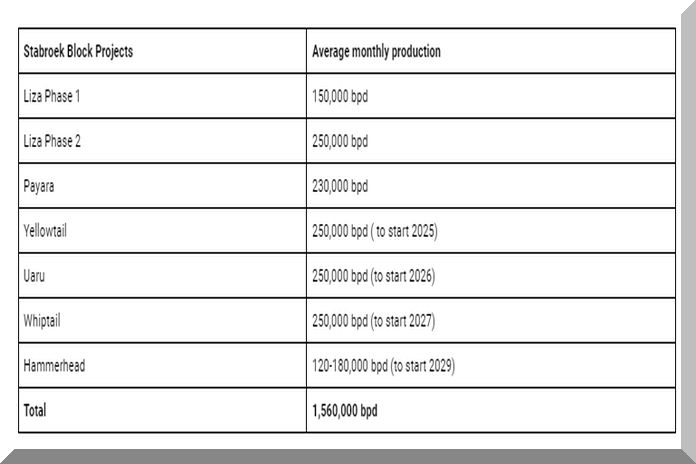GEORGETOWN, Guyana, (DPI) – The Environmental Protection Agency (EPA) has commenced the review of an application from ExxonMobil Guyana to develop a seventh oil project at the Hammerhead field in the Stabroek Block.
According to the project summary on the agency’s website, this project is expected to add 120,000 to 180,000 barrels of oil per day (bpd) following start-up in 2029.
While the preliminary production capacity for the seventh vessel is 120,000 to 180,000 bpd and gas production are projected to be 60 to 120 million standard cubic feet per day, Exxon was keen to remind in its project summary that it looks “for opportunities to safely optimize that capacity” after initial start-up.
Once the Hammerhead project is brought online to operate alongside an armada of six sanctioned projects in the Stabroek Block, Guyana’s oil production output will hit approximately 1.5 million bpd. The EPA said in a public notice published July 14, 2024, that the proposed project will be undertaken largely in the marine offshore environment.
As a result of the intended developmental activities, possible effects to the environment may include impacts on marine water quality, air quality, marine fauna, and socio-economic resources, among others. The regulator therefore instructed ExxonMobil Guyana to submit an Environmental Impact Assessment (EIA) for the Hammerhead project.
The environmental regulator further noted that members of the public are invited, within 28 days of the July 14 Notice, to make written submissions to the agency, setting out those questions and matters that they require to be answered or considered in the EIA.
Documents lodged with the EPA reveal that the Hammerhead project is located in the south-central portion of the Stabroek Block, approximately 160 km from Georgetown and amid previous Stabroek Projects. Current plans include drilling via drill ships to produce oil using approximately 14 – 30 production and injection wells.
The production facilities to be installed include subsea equipment attached to the seafloor as well as processing equipment on the ocean’s surface known as a floating, production, storage and offloading (FPSO) vessel.
“The vessel will be capable of storing approximately 1.4 to 2 million barrels of oil. Third-party oil tankers will be scheduled to offload the oil from the FPSO, making the oil available for export to the international market,” the project summary stated.
The FPSO will also process, dehydrate, and compress associated gas produced from the reservoir. Several options for the management of the associated gas are being evaluated.
The Hammerhead Project is expected to contribute directly and indirectly to economic growth in Guyana, including increased national revenues, local procurement of select goods and services, and increased direct and indirect local employment opportunities which drive associated beneficial “multiplier” impacts throughout the local economy.





